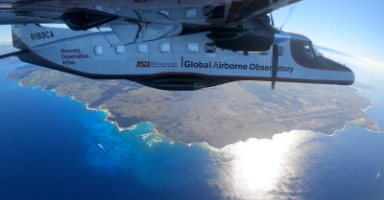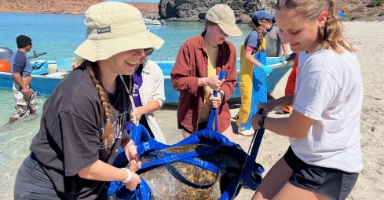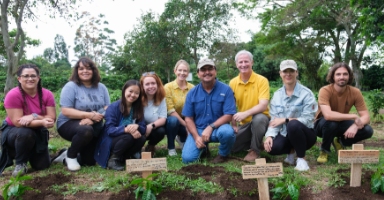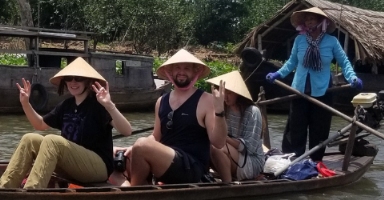
Where we work
In a word…everywhere.
With its headquarters on the ASU Tempe campus, the Julie Ann Wrigley Global Futures Laboratory® has experts on the ground and able to be deployed to locations around the world where research opportunities present themselves or assistance is needed.
From the heart of the Sonoran Desert to the Pacific and Atlantic Oceans, the Global Futures Laboratory is conducting its work in leading-edge facilities where our world’s planetary systems are being stressed. It is from these physical vantage points that we are able to best diagnose and anticipate global challenges and help design potential futures where all of Earth’s inhabitants may thrive.

Tempe, Arizona
ASU main campusHawaii
Hilo and HonoluluBermuda
ASU BIOSWashington D.C
Los Angeles, California
Facilities

Walton Center for Planetary Health
The gateway for ASU’s Tempe campus and the headquarters for the Global Futures Laboratory, the Walton Center is a LEED Platinum facility and sits at an intersection of multiple significant historical markers. It is home to more than 281,000 square feet of programmable space, 70,000 of which is dedicated to laboratory use.

ISTB X
Formerly known as Wrigley Hall, ISTB X accommodates ASU’s School for the Future of Innovation in Society, a program within the College of Global Futures. The building is certified LEED Silver and utilizes high-recycled-content materials and low-emitting indoor paints and takes advantage of the abundant natural sunlight available.

ASU Bermuda Institute of Ocean Sciences
Based in the heart of the North Atlantic Ocean, ASU BIOS has been conducting ocean and marine science research since 1903. Scientists can easily venture into the surrounding Sargasso Sea, one of the world’s most diverse open-ocean ecosystems, as well as investigate some of the world’s most northern coral reefs found in Bermuda. ASU BIOS is also home to the Research Vessel Atlantic Explorer as well as its numerous labs.

Hawaii
The Global Futures Laboratory has two programs based in Hawaii. The Center for Global Discovery and Conservation Science is located in a joint facility in Hilo that is administered by the U.S. Forest Service and houses computational and chemical labs, offices, conference rooms and field operations space. The Research on Island Solutions for Adaptation program is a NOAA Climate Adaptation Partnership located at the East-West Center in Honolulu.
Learn about the Center for Global Discovery and Conservation Science
Learn more about Pacific RISA
Washington, D.C.
The Barrett & O’Connor Center is ASU’s permanent home in the nation’s capital, this facility enables broad institutional effort to support national priorities through education, leadership, convening and engagement. This site is home to the Consortium for Science, Policy and Outcomes, a network aimed at enhancing the contribution of science and technology to society’s pursuit of equality, justice, freedom and overall quality of life.
Learn more about Washing, D.C.
Learn more about the Consortium for Science, Policy & Outcomes
ASU California Center
In the heart of downtown Los Angeles, the ASU California Center provides a vital convening point for hundreds of globally oriented industries that include business, sustainability, engineering, journalism and law. It also serves as a gateway for thousands of California-based students and connects them to high-demand jobs and internships throughout the state and the world.
Mobile facilities

Decision Theater
The Decision Theater organizes researchers, policymakers and the business community to better understand and explore solutions to complex issues facing society. In addition to permanent facilities in Arizona and Washington, D.C., Decision Theater is able to mobilize its experts and technology to meet partners where they are and even assist and guide partners to create their own Decision Theater hub.

R/V Atlantic Explorer
A general purpose oceanographic research vessel designed for both short and extended cruises, the R/V Atlantic Explorer can carry a crew of 12 and a scientific party of 22 researchers, students and technicians for up to 28 days or 5,500 nautical miles. With comprehensive on-board lab and exploration equipment, the vessel is part of the U.S. Academic Research Fleet (UNOLS), a sub-fleet to the U.S Federal Oceanographic Fleet.

Global Airborne Observatory
Now in its third generation, the Global Airborne Observatory is a complete airborne laboratory based on a highly modified aircraft, carrying what is widely regarded as the most advanced mapping technology operating in the civil sector today. The GAO has been deployed over a global range of ecosystems — from coral reefs to savannas to rainforests — to collect data that has directly shaped policy and conservation, such as efforts to track and contain a tree-killing fungus in Hawaii and plans for creating a new marine protected area in the Dominican Republic.
Study abroad

Antarctica
ASU’s only study abroad program to the world’s most remote continent. In this program, students learn about the history, wildlife, socio-cultural and political dimensions and environment of Antarctica in the classroom and in person.

Baja California, Mexico
Students participate in a sea turtle monitoring and research project recognized around the world as a model for community-based conservation. They also visit small fishing camps to learn about different fishing gear and sustainable fishing practices with local fisher leaders.

Botswana
ASU students join students, faculty and researchers from Africa and London to study in the Okavango Delta, a UNESCO World Heritage site and home to the most spectacular African wildlife. There they conduct field research including wildlife and water bird surveys and study how government, nonprofits, universities and local people are collaborating in support of sustainable development.

Brazil
This program explores contemporary Brazilian society and politics, framing this large and diverse nation in a global context and demonstrating the urgency of greater U.S.-Brazil cooperation and understanding. Students engage with representatives from the U.S. State Department, Brazilian ministries, respected academics, and indigenous and climate activists to understand the profound challenges of inequality, sustainability and economic development.

Costa Rica
Students are immersed in the world of global coffee and sustainability at Hacienda Alsacia — a 240 hectare (593 acre) coffee farm and Starbucks global agronomy headquarters for research and development.

Ecuador
The program builds on a five-year partnership between ASU professors and Indigenous communities so that students may learn from Kichwa and Waorani knowledge and biocultures to explore challenges and possible solutions for sustaining the Amazon. Upon completion of the program, students are able to combine Indigenous and scientific knowledge to support biocultural approaches to conservation, sustainability solutions for challenging Amazonian systems, and eco-tourism projects that generate local income while supporting local biocultures and ecosystems.

Hong Kong
Using Hong Kong as the setting to learn how a complex, densely populated, world-class city is addressing such challenges, students explore the “front lines” of sustainability with students and faculty from City University of Hong Kong (CityU). Through these field trips, they interact with Hong Kong leaders, academics and sustainability practitioners to understand the city’s sustainability policies and programs.
Program details to come.

Vietnam
This program explores economic, political and cultural survival in the face of human and natural challenges. Experiencing a region that has witnessed the rise and fall of civilizations, change and resilience, students see firsthand how rising sea levels affect not only coastal cities, but the inner regions of the Mekong Delta, and how adaptation strategies, both new and ancient, can help solve flooding challenges.
It is imperative that the next generation of changemakers have access to hands-on immersive learning experiences like study abroad so that they can learn and prepare for the complex global challenges of today and tomorrow.
Sharon Hall Associate Dean and President Professor